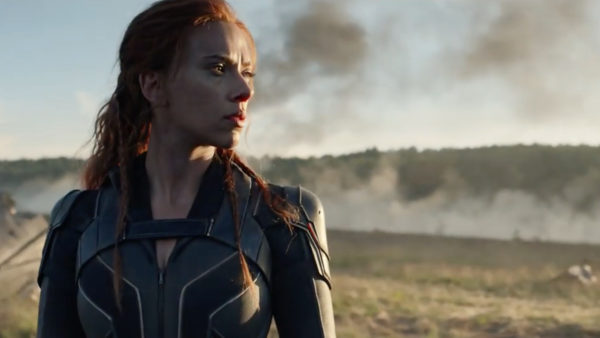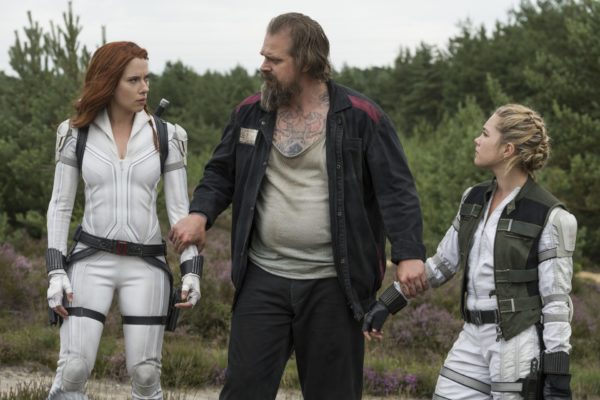
After a long delay, Disney’s Black Widow (and Phase 4 of the MCU) is finally ready to make its debut.
Considering the mildly unceremonious mid-film death of the character in Avengers: Endgame, it’s nice to see Scarlett Johansson don the moniker one last time. The new film, written by Eric Pearson (with a story credit from Ned Benson and Jac Schaeffer), is set in the aftermath of Captain America: Civil War when the Avengers are scattered and divided. This is invaluable not only for resetting the clock on a dead character, but for hand waving away why Natasha Romanoff (Johansson) can’t call on her super powerful friends when she finds herself in a thorny situation.
What Black Widow understands well is its need to be more than merely an extra lap for a character who deserved a bigger send-off. This is more than just another opportunity to get Johansson back into costume; Black Widow has a proper, compelling story to tell about the character’s origins and, smartly, opts to situate its narrative in a slightly more grounded sandbox than many of its catastrophic, world-ending MCU counterparts. Not only is this a prequel that explains how Romanoff became an accomplished Russian assassin, it also establishes the basis of her relationship with Hawkeye (Jeremy Renner) and why she was so dedicated to the concept of the Avengers as a de facto family.
Possibly the film’s biggest surprise is that Black Widow is much more of an ensemble than anticipated. Johansson may be the lead, but Black Widow’s real star is Florence Pugh. With star-making turns in films like Midsommar and Little Women, it’s hardly surprising that she can hold her own. The reality is that Johansson winds up playing the straight man in her own film, leaving the comedic relief to Yelena, Pugh’s little sister character (and, to a lesser extent, David Harbour’s Alexei).
The film’s plot is refreshingly straight-forward. After an exciting cold open in which pre-teen Natasha and Yelena, together with their undercover “parents”, Melina (Rachel Weisz) and Alexei, flee Ohio for Cuba in 1995, the action jumps ahead 21 years. At this point, Natasha is on the run from the American military, briefly represented by a de-aged William Hurt, reprising his role as General Thaddeus Ross. Natasha hides out in a camper in Norway, where she barely sets up shop before she’s attacked by a cyborg who attempts to steal a package shipped from a safe house in Budapest. The package contains vials of red gas that, as we learn in Yelena’s stand-alone introductory scene, reverse the effects of a chemically-induced mind-control experiment.
When Natasha arrives in Budapest, she and her estranged sister are very quickly forced to go on the run when a band of Black Widows, including the mysterious cyborg, descend upon them. From there the stage is set for a reunion with their surrogate parents as they join forces to take down General Dreykov (Ray Winstone), the man behind the mysterious Red Room, aka the Black Widow assassin program, that ruined both Natasha and Yelena’s lives.

Arguably one of the Black Widow’s best decisions is eschewing some of the more grandiose superhero theatrics in favour of spy movie conventions. Several of the early setpieces, including Natasha’s fight at the bridge, the sister vs sister battle in the safe house and a car chase into the Budapest subway system, are all reasonably grounded in a Bourne Identity kind of way. There’s even a post-fight scene when the sisters pause to catch their breath and buy painkillers at the convenience store which deliberately reinforces the idea these incredibly skilled women are still flesh and blood humans.
This fits in well with the film’s inherent interest in the concept of family, and more specifically, the notion of chosen families. Black Widow is driven by the familial associations established in the opening scene when the unrelated foursome pretended to be a family for three years, including posing for photos and learning life lessons. Since Yelena was so young, she internalized the relationships as real and, even as a self-aware adult, she can’t let go of their importance, in part because she and Natasha never had real families.
The notion of family, responsibility and parenting is revisited constantly throughout the film; whole setpieces are constructed around the literal reunification of this nuclear unit (one involves breaking Alexei out of prison; another involves an attack at Melina’s farm). In that regard, Black Widow is an intriguingly “human” film (so much so that the maniacal plot by Dreykov hardly matters until the third act when it comes time to deliver the usual FX-heavy Marvel finale).

When the film is invested in the quieter moments, and particularly when it allows Pugh to step away from her role as comedic relief role in order to address the character’s trauma, Black Widow is surprisingly, emotionally potent.
Naturally the film can’t simply abandon its action movie roots. As Black Widow progresses, it loses not only the grounded, real-world spy action setpieces (the prison heist, while electrifying, is completely ridiculous and the finale even moreso). It’s the expected outcome, however, and director Cate Shortland does manages to strike a good balance the human drama and the superhero action that audiences demand. Editors Leigh Folsom Boyd and Matthew Schmidt, on the other hand, are too heavy handed with their edits of the fight scenes, which tend to lose perspective and occasionally even become challenging to follow.
The Bottom Line: Black Widow is a solid middle-tier Marvel entry. Care has been taken to center the human drama while the action, particularly the early more spy-influenced set pieces, is enjoyable up until the film’s slide into increasingly ridiculous FX territory for the finale. Black Widow may not be the swan song for Natasha Romanoff that audiences expected, but the film is a dazzling debut for Florence Pugh’s Yelena, who will undoubtedly prove to be a worthy successor to the title in future entries.
Oh, also, if anyone knows what’s going on with Weisz’s weird, fluctuating Russian accent, please let me know. 3.5/5
Black Widow arrives in theatres and on Disney+ with Premier Access on July 9, 2021